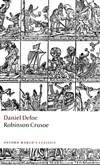Robinson Crusoe
- 中文名:
- 鲁宾逊漂流记
- 作者:
- 丹尼尔·笛福 Daniel Defoe
- 类型:
- 小说经典
- 可下载格式:
- PDF TXT
- 解压密码:
- www.qcenglish.com [点击复制]
- 收藏和分享鲁宾逊漂流记:
- 鲁宾逊漂流记(Robinson Crusoe)简介:
- One of the first novels ever written, Daniel Defoe's Robinson Crusoe (1719), the classic adventure story of a man marooned on an island for nearly 30 years, is part of our culture. From Scott O'Dell's Island of the Blue Dolphins (1960) to the recent movie Castaway, the elemental situation of the person suddenly alone, who must make a life in a dangerous environment, continues to enthrall all ages. Yet few adults, never mind young people, can wade through Defoe's lengthy tome with its convoluted eighteenth-century prose. So here's a shortened storybook version--retold by Timothy Meis in accessible style, yet true to the spirit of the original and the time when it was first published--in a large picture-book format with clear type, high-quality paper, and more than a dozen unforgettable narrative paintings by Wyeth, first published in 1920 and newly reproduced here in glowing color.
The story begins with the universal quest: the young man in Britain, torn between his safe home and his hunger for adventure, breaks away from his loving father and sails away into the unknown. After a series of harrowing escapes, he's shipwrecked on a desert island. His lively first-person account shows how his intelligence and education help him survive for many years, and how he uses technology, including guns and tools salvaged from the ship. He sets up home, reads the Bible, finds a parrot as a pet, and even devises a calendar to keep track of time. Then one day he finds a human footprint: "Was it someone who could save me and take me back to civilization? Or was it a savage who landed here?" When some "savages" arrive in several canoes, he uses his guns to get rid of them, and he rescues one of their captives, a handsome fellow with very dark skin. Delighted to have a companion at last, Crusoe names the newcomer Friday (since Crusoe found him on Friday). Crusoe teaches "my man Friday" to speak English, fire a gun, carve a canoe, and clothe his nakedness, and they live happily together. Later they rescue a white man and Friday's father from a group of "savages," and, eventually, they all return to their homes.
Defoe is said to have based his novel on the true adventures of Alexander Selkirk (who spent four or five years on an island in the South Pacific) and on accounts of other castaways of the time. The survival adventure is still enthralling. But what about the racism? This is clearly the classic colonialist story, but whose history is it? And how will young people read it today? Is it just boring, politically correct nitpicking to object to the use of the word "savages" throughout the book and even on the book flap? Yes, there are some bad guys among the whites, but even they are called "men"; the dark-skinned people are always known as "savages." How do we talk about this story today? The guns and tools make Crusoe boss, but wouldn't Friday have been able to teach the newcomer some survival skills? Does it never occur to Crusoe to learn Friday's own name and language? Who discovered whom? Wyeth's clear, action-packed illustrations are magnificent. But there's one shockingly jarring scene of Friday groveling in gratitude at Crusoe's feet. When the whites say thanks, they embrace each other.
So, no, the objections are not just P. C. sermonizing. The racism is highly offensive. But the fact that the story is so widely known and has such elemental appeal makes this an excellent book for discussion, especially in classes studying the history of exploration and discovery. Louise Erdrich addressed a similar problem [BKL Ap 1 99] when she commented that although she had loved the Little House books as a child, in rereading them as an adult, she was shocked to recognize that "not only was there no consciousness about the displaced people whose land the newcomers were taking, but also that there was a fair amount of racism." Still, she disagrees with censorship of any kind: "The best way is for good teachers and parents to install racism radar detectors so that kids can make their own judgments, because they're going to have to."

推荐书籍
-
太阳照常升起
小说经典
The Sun Also Rises
Ernest Hemingway
欧内斯特·海明威
-
双城记
小说经典
A Tale of Two Cities
Charles Dickens
查尔斯·狄更斯
-
歌德诗集
小说经典
The Poems of Goethe
Johann Wolfgang Von Goethe
歌德
-
麦琪的礼物
小说经典
The Gift of the Magi
O. Henry
欧·亨利
-
嘉莉妹妹
小说经典
Sister Carrie
Theodore Dreiser
西奥多·德莱塞
-
小兄弟
小说经典
Little Brother
Cory Doctorow
科利·多克托罗
排行书籍
-
了不起的盖茨比
小说经典
The Great Gatsby
F. Scott Fitzgerald
F·斯科特·菲茨杰拉德
-
麦田里的守望者
小说经典
The Catcher in the Rye
J.D. Salinger
J·D·塞林格
-
老人与海
小说经典
The Old Man and the Sea
Ernest Hemingway
欧内斯特·海明威
-
傲慢与偏见
小说经典
Pride and Prejudice
Jane Austen
简·奥斯丁
-
国富论
经济学
The Wealth of Nations
Adam Smith
亚当·斯密
-
乱世佳人
小说经典
Gone with the Wind
Margaret Mitchell
玛格丽特·米切尔
-
哈利·波特与魔法石
儿童读物
Harry Potter and the Philosopher’s Stone
J.K. Rowling
J.K.罗琳
-
百年孤独
小说经典
One Hundred Years of Solitude
Gabriel Garcia Marquez
加西亚·马尔克斯
-
失落的秘符
神秘惊悚
The Lost Symbol
Dan Brown
丹·布朗
-
英语语法手册
英语语法
English Grammar In Use
Raymond Murphy
雷蒙德·墨菲
-
秘密
励志成功
The Secret
Rhonda Byrne
朗达·拜恩
-
世界是平的
经济学
The World is Flat
Thomas Friedman
托马斯·弗里德曼
-
权力的游戏(冰与火之歌第一部)
科幻魔幻
A Game of Thrones (A Song of Ice and Fire, Book 1)
George R.R. Martin
乔治·R·R·马丁
-
万物简史
自然科学总论
A Short History of Nearly Everything
Bill Bryson
比尔·布莱森
-
谁动了我的奶酪
处事哲学
Who Moved My Cheese
Spencer Johnson
斯宾塞·约翰逊
